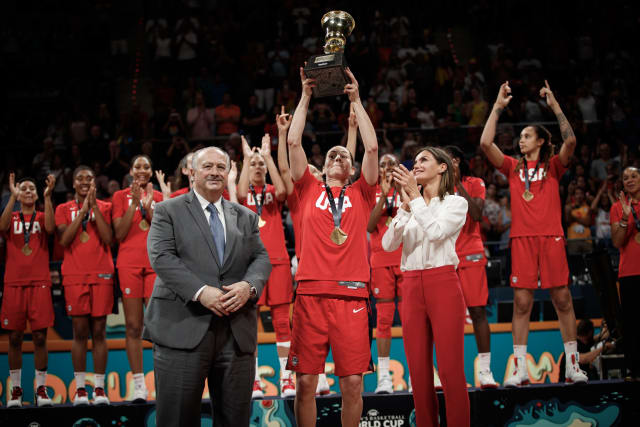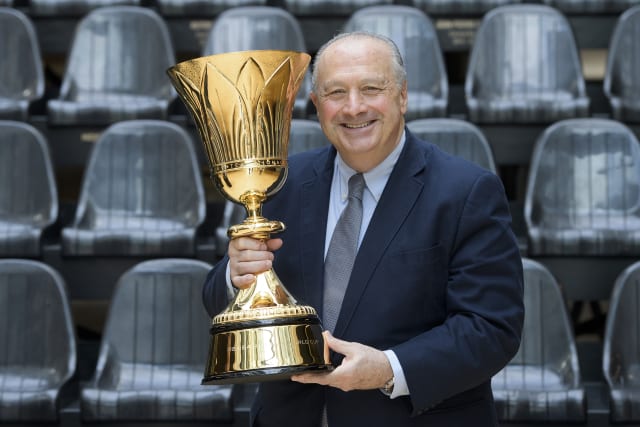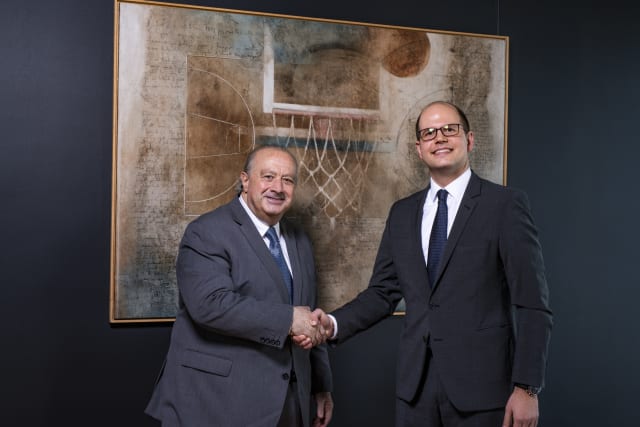FIBA President Muratore reflects on eventful past 12 months, casts a glance ahead to exciting 2019
MIES - As 2018 winds to a close, FIBA President Horacio Muratore took time to reflect on the past year and look ahead to what lied ahead in 2019.
MIES - As 2018 winds to a close, FIBA President Horacio Muratore took time to reflect on the past year and look ahead to what lies ahead in 2019.
Mr Muratore, whose term of office will conclude next summer, spoke to FIBA.basketball to:
provide an update on the Qualifiers and build-up to the FIBA Basketball World Cup 2019; look back on the success of the FIBA Women's Basketball World Cup 2018; discuss the development of FIBA's National Member Federations; stress the responsibility of continuing the work carried out by Patrick Baumann on 3x3; talk about the appointment of Andreas Zagklis as FIBA's fourth Secretary General. [/unordered]In November 2017, the FIBA Men's National Team Competition System was launched with the start of the FIBA Basketball World Cup 2019 Qualifiers. Now, more than a year on, and with five of the six windows completed, you have an extensive measure of how successful it has been and how it has lived up to expectations.
(Before launching the system), We were the only team sport that didn't have national team activity throughout the year. Virtually all successful team sports have had it one way or another except for us. Football has it. Volleyball has it. Handball has it. Ice hockey has it. Players travel all over the world.
When we see the packed venues and witness the joy (of the fans, teams, players) at games of the Qualifiers throughout the world and when we listen to comments about playing at home from current players - as well as retired players - and how they never had that possibility before to play in front of their home crowd… it all points to the fact that we have achieved what we set out to do.
I want to thank all the national federations around the world for the work they have done. It's been fantastic. Our model has been successful and will continue to be so.
FIBA is making a huge financial commitment of more than €30 million to ensure the best possible implementation of the FIBA Men's National Team Competitions System & Calendar in its first cycle (2017-2021). Most notably, this is seeing us cover the core costs of operations including television production as well as costs for officials and referees. Additionally, we are also providing insurance for all of the players involved.
"WHEN WE SEE THE PACKED VENUES AT GAMES AND LISTEN TO THE COMMENTS OF CURRENT AND PAST PLAYERS ABOUT HOW (BEFORE THE QUALIFIERS) THEY NEVER HAD THAT POSSIBILITY BEFORE TO PLAY IN FRONT OF THEIR HOME CROWD... IT ALL POINTS TO THE FACT THAT WE HAVE ACHIEVED WHAT WE SET OUT TO DO."
We're very happy with the system and we would have been delighted had it not been for the problem we had with the Euroleague. It really surprised us. We tried to work together and from the start they said no. We wanted to build, not to take away from anyone. I cannot understand how, some of Europe's biggest clubs, who allow their football players to join their national teams, don't do the same with basketball. They're the same club. Our aim is to help every structure - starting with the national federations - to better develop basketball in their respective country. That includes club competitions in order to reinforce their national leagues. While we want strong national federations, we also need very strong club competitions.
We look forward to February when the final window of the Qualifiers will take place. There will be 26 teams competing for the final 14 qualifying places to the World Cup. That's incredibly exciting and speaks to the high quality and competitiveness of these Qualifiers.
What are your thoughts as you look back on the FIBA Women's Basketball World Cup 2018 in Tenerife?
It was a great success and an incredible example to see the Spanish Basketball Federation (FEB) work together with the Canary Islands government and local authorities in Tenerife. I was very touched when the mayor of Puerto de la Cruz invited the teams that were staying in their town to give them a tribute. Everyone was involved in that organization and that is what we want. We must thank them, especially Manuel Gomez, the President of the Canarias Basketball Federation and FEB President Jorge Garbajosa.

As for the competition itself, I had never seen a women's team play like Belgium. It was great to see their success and the performances by the champions USA and other teams. We also need to make a special mention of the teams from Africa (Nigeria and Senegal) who had historic results.
The event was also special because that is when FIBA Executive Committee member Lena Wallin-Kantzy - who is dedicated to the development of women's basketball - held the first press conference on the FIBA Women's National Team Competition System.
The new system has been approved, we're working on it and it will launch in November 2019. Having more regular national team games and competition will see more women remain in our sport. I see a great future for the women's game.
One of FIBA's strategic pillars that has been a staple of your presidency is the development of its National Member Federations.
This was a strategic pillar for FIBA, approved in 2014 by the same Congress in Sevilla that elected me as President.
We have already visited 181 federations. The ones we haven't visited are the big ones who, for the time being, don't need our support. So we're looking at all of the other federations that have not been able to compete internationally but have significant growth potential. We want a solid group with which to build a four-year program.
The principle is to have instructors that coach local instructors so it creates an incredible multiplying and ripple effect. Looking at the financial and institutional aspects, this is all a huge investment. We want to do a lot more but this has to be the starting point.
We also need the support of the federations from within. It's not just a case of us going there, we need for the federation to get to work. We are encouraging them to see that FIBA's effort must be accompanied by that of their respective Olympic committees and sports ministries in their countries.
I have taken part in many visits and it's exciting and satisfying to see the happiness of the people in those federations.
Looking to next year, obviously the FIBA Basketball World Cup 2019 in China is the must-see event.
Yes this is our biggest project and we're very hopeful it will be the best World Cup yet. We have increased the number of participants from 24 to 32. This will give our sports much more visibility around the world.
It's also important to see the World Cup itself as being the culmination point of what has been an extraordinary two-year build-up period. During this time, the competition has been talked about and celebrated thanks to the Qualifiers that have taken place in 80 countries across the globe. Add to this the fact that we have global icons such as Kobe Bryant and Yao Ming as ambassadors and it is truly like nothing we've ever had before.

As part of the FIBA Men's National Team Competition System, we have tied together the World Cup and Olympics. In the past, some national federations sent their best team to the Olympics but now they must have their best team where we want it to be, at our World Cup, which is our biggest event.
From an organizational standpoint, holding a FIBA Basketball World Cup in eight cities across the size of China is an incredible job. Each of these cities has a size bigger than some European countries, so the challenge is big. But we have increased our presence in China and we are working well together with the local organizers.
As well as the World Cup living up to expectations, you will also be looking for 3x3 to continue building on the huge strides it has achieved, particularly in this past year alone.
Yes 3x3 is on an upward trajectory and everything has to be done for that to continue and for the discipline to carry the right momentum ahead of its historic debut at the Tokyo 2020 Olympic Games.
"THERE IS A GREAT SENSE OF RESPONSIBILITY WITH 3x3, WHICH IS TO CONTINUE THE FANTASTIC JOB THAT PATRICK (BAUMANN) DID WITH IT. WE'RE EXTREMELY INDEBTED TO HIM FOR HAVING BEEN SUCH A STRONG ADVOCATE OF 3x3."
This past year, there was an increase in the number of official FIBA 3x3 events from 38 to 63 and qualification to the FIBA 3x3 World Tour took place in an unprecedented 50 countries.
There is a great sense of responsibility with 3x3, which is to continue the fantastic job that (former FIBA Secretary General) Patrick (Baumann) did with it. We're extremely indebted to him for having been such a strong advocate of 3x3. Everyone saw it as something unachievable, but he was able to get people to understand it and have the President of the International Olympic Committee (IOC) say it was fantastic. No one from the IOC had any doubts about the decision they took regarding the inclusion of 3x3 as part of the Olympic Basketball Program and that is the biggest tribute that can be given to Patrick.
It's impossible to look back on the past year without thinking of the incredibly sad moment that was FIBA Secretary General Patrick Baumann tragically passing away.
It has been traumatic for us, especially the way he left us. It affected me personally because he was a true friend. It was very painful. It left us all numb, but we have reacted strongly because Patrick left a strong federation, well-structured and with ongoing projects. FIBA is an example of his legacy, a structure that was able to continue to run against any adversity. So much so, that three days after Patrick passed away, we were already meeting with the directors who informed us of the ongoing projects so that we could set priorities.
We're thankful that we got to pay tribute to him and say goodbye at a memorial service in his honor, where the turnout - of members of the basketball family and the global sports and Olympic community - was a true reflection of how revered and respected he was.
Can you speak about Andreas Zagklis and the qualities that makes him suited to be FIBA's new Secretary General?
I have talked to many people who have confirmed what I believe: that Andreas is the right person to be FIBA's fourth Secretary General.
He is very familiar with the world of International Federations and the Olympic Family. Furthermore, he is highly respected within those circles.
"I'M CONVINCED ANDREAS WILL UNITE THE BASKETBALL COMMUNITY. WE HAVE 213 NATIONAL FEDERATIONS AND WE'RE ALL DIFFERENT BUT WE'RE UNITED AND HE IS THE RIGHT PERSON TO LEAD US."
The group tasked with the appointment of a new Secretary General - consisting of myself, FIBA First Vice-President Hamane Niang and FIBA Treasurer Ingo Weiss - was convinced Andreas was the right man for the job. This was backed by the fact that the Central Board and Executive Committee unanimously appointed him. Keep in mind that the Central Board represents the world of basketball and therefore he was approved by the global basketball family.
I'm confident we have the best man for the job as I have had the opportunity to work directly with Andreas on many projects.

He has worked for FIBA for 11 years and, among his many qualities, possesses the abilities to analyze and deal with any situation. He is also a true basketball man and like many of us started out as a player. He has known basketball since he was a child and, in order to be at FIBA, you need passion. Andreas most definitely has the passion for our sport in him.
Obviously he will have his own style and I'm convinced he will unite the basketball community. We have 213 National Federations and we're all different but we are one basketball community and he is the right person to lead us.
FIBA